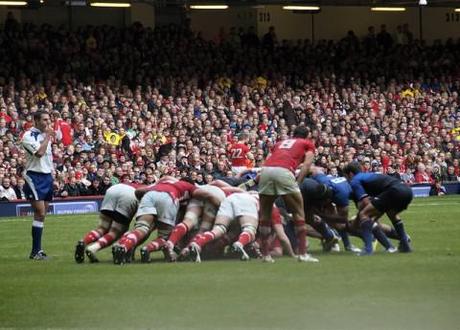
Wales scrum down versus France. Photo credit: Mattappleby
Wales won their third Six Nations Grand Slam in eight years with a gritty 16-9 win over France at Cardiff’s rain-drenched Millennium Stadium on Saturday. By any measure that is a tremendous achievement for a rugby nation. But just how good is this young Welsh team? And can they now go on and lift the 2015 World Cup? Those are the questions on the lips of rugby-lovers and sports writers.
Wales face stern tests in June – they play Tests in Brisbane, Melbourne and Sydney.
No limits to what they can achieve. James Lawton of The Independent was full of praise for Wales: “The Welsh Grand Slammers may not have turned the valley skies into the most luxuriant crimson but who could not be warmed by the glow of their achievement, by that sense that they had been faithful to the ultimate demand made by all true professionals? It is that you deliver the very best that you have and if Dan Lydiate and Leigh Halfpenny happened to exceed dramatically their particular quotas, each one of their team-mates had reason to leave the field with bone-deep pride.” Lawton was upbeat about Wales prospects of pushing on from the latest Grand Slam triumph: “This Welsh team may lack the extraordinary wit and reach of talent enjoyed by Merv the Swerve’s team, Halfpenny may not yet be JPR or Priestland a Barry John or a Phil Bennett, but in a different age and a different game they have plainly established their ability to compete at the highest level.” Lawton concluded that the “unstaunched conviction” of Wales squad “says the championship of Europe might just be a start.”
Wales Grand Slam win was their 11th in total. They are now within one of England’s record of 12. Wales have joined the French as three-time Grand Slammers in the Six Nations era.
World class squad. At his BBC Sport blog, Bryn Palmer argued that Wales could well now have the squad to really trouble the southern hemisphere titans Australia, New Zealand and South Africa: “The most exciting aspect for the whole Red Dragonhood is the promise of more. Wales already had arguably five world-class players in Gethin Jenkins, Adam Jones, Sam Warburton, Mike Phillips and Jamie Roberts. The likes of Dan Lydiate, Toby Faletau, Luke Charteris, Ian Evans, Jonathan Davies, George North and Leigh Halfpenny have all the ingredients to achieve similar status, if some of them are not there already. Wales now have a squad rich in quality and depth … No longer are Wales irrevocably damaged by the loss of two or three frontline players to injury.” Palmer noted that, during the Six Nations, Jenkins, Warburton and Charteris were all missing at various times, “but their absence did not affect performance levels or results.”
Parochial poster-boys? In The Telegraph, Ex-England and British Lions hooker-turned key rugby commentator Brian Moore insisted that Wales “still have some way to go to become world beaters” and argued that the “quality of this Slam was not the equal of 2008.” Moore praised Wales’ Lydiate-inspired back row but sniped that “their front five en masse is solid, not spectacular. They have not yet reached the machine-like efficiency of the All Blacks and Springboks and it is against that template that they have to be happy to be judged if they are to be more than parochial poster-boys.”
Edwards: We must move straight on. “After Wales grand slam party it is time to move on,” insisted former Wales scrum-half and current assistant coach Shaun Edwards at The Guardian’s Sport Blog, who reminded his countrymen that “you can’t rest on a grand slam, even if it is the second in four years. Our experience of 2008 is that you have to crack on.” “Saturday against France we won, but we kicked a lot,” noted Edwards, who urged Wales to steer clear of too much “aerial ping pong” Down Under. Edwards attributed the uptick in kicking partly to “orders from the powers that be concerning how the tackle should be refereed. It seemed more and more obvious to me as the Six Nations progressed that the refs had been instructed to referee the tackle to the letter of the law, rather than give a little bit of latitude to the attacking side. No matter that the balance seemed to be right at last autumn’s World Cup, increased whistling has been the order of the day and with teams once again worried about losing the ball in their own territory, they have opted to kick again.”

